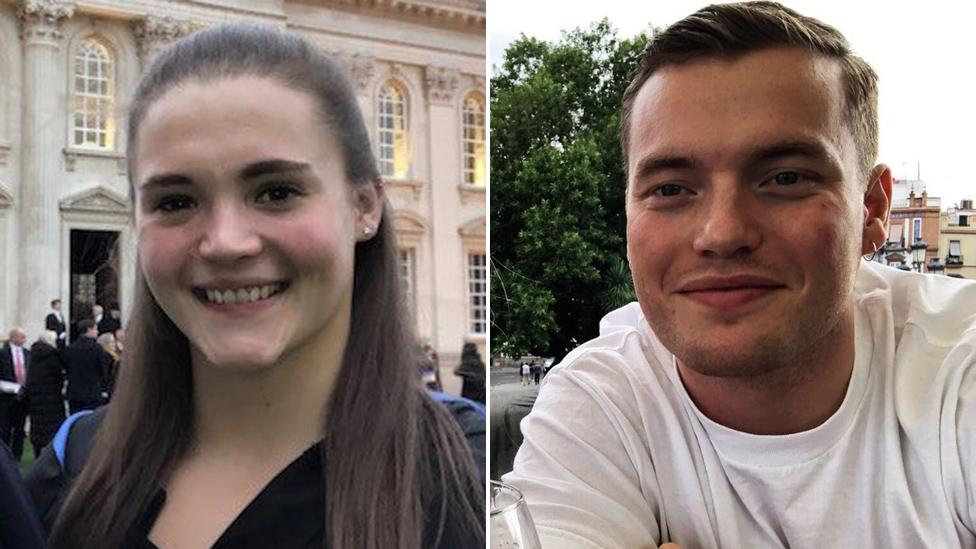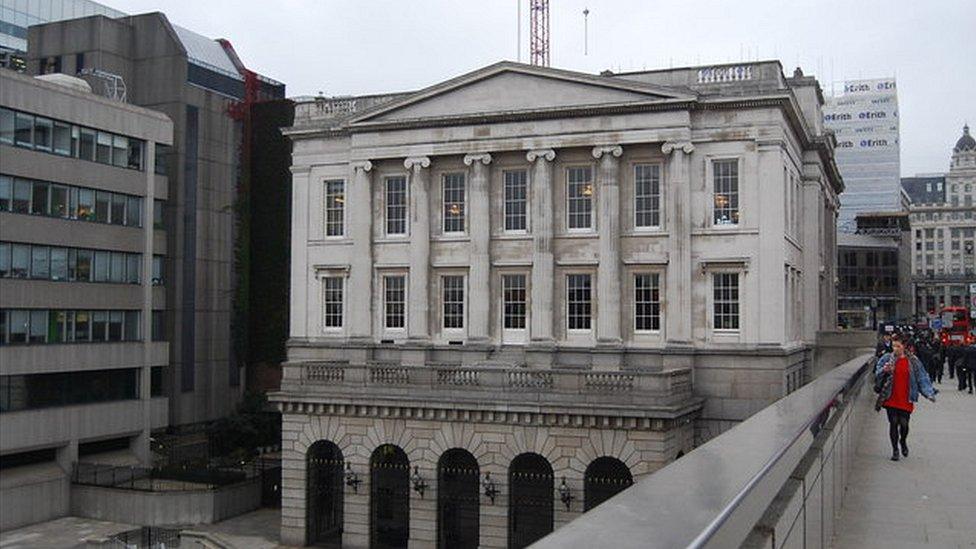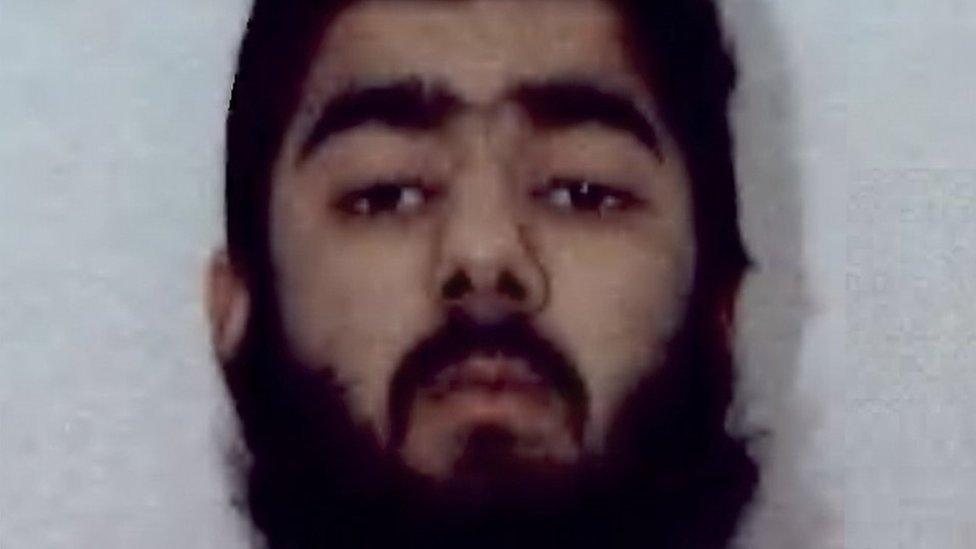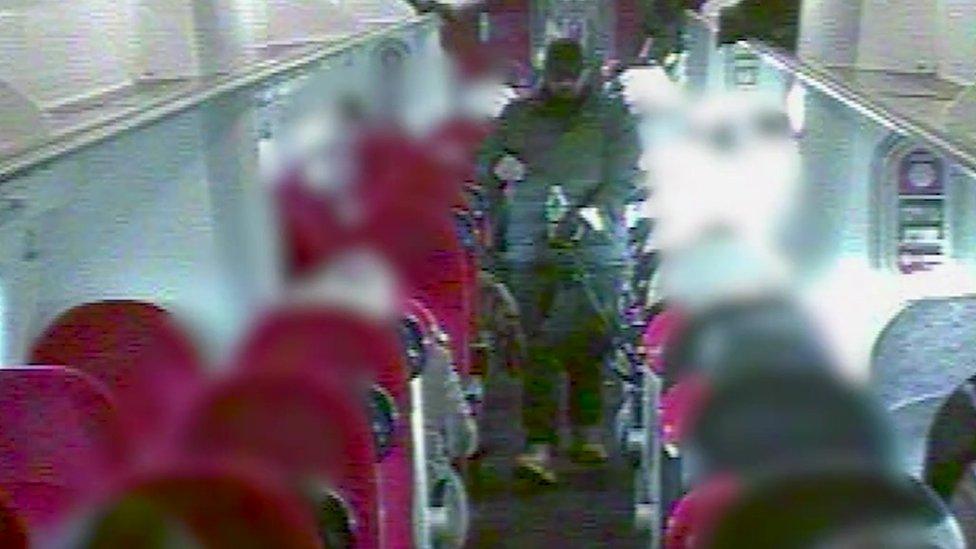Could Fishmongers' Hall attacker Usman Khan have been stopped?
- Published

Saskia Jones, 23, and Jack Merritt, 25, were killed by Usman Khan during a conference on rehabilitating offenders
Three simple facts became crystal clear over the course of the inquests into the Fishmongers' Hall terrorism attack, in which Jack Merritt and Saskia Jones died at the hand of Usman Khan.
Firstly, Khan, had entered and left prison as one of the most dangerous terrorism offenders of his generation.
Secondly, while counter-terrorism experts and investigators fully understood the threat he posed, some of the people directly interacting with Khan did not know all of those fears.
And thirdly, by the time Khan had decided to kill, nobody knew whether he was plotting or not - and so his trip went ahead without anyone being sure what risk he posed when he was allowed to travel to London alone.
Why was Usman Khan in London?

Fishmongers' Hall, beside London Bridge, was the venue for the event
Usman Khan came to London on 29 November 2019 to take part in a special event organised by Learning Together, a Cambridge University programme in which its graduates help offenders with their rehabilitation.
The scheme began at Grendon Prison, a specialist jail in Buckinghamshire that puts inmates through intensive psychological and behavioural therapy.
Khan joined when the scheme was later introduced at the maximum security Whitemoor Prison in Cambridgeshire.
Prior to that, Learning Together had no experience of working with terrorism offenders - who typically think and behave completely differently to other violent criminals.
In time, Khan came to be regarded as a success story - and Learning Together's chiefs invited him to the London reunion.
Why was Khan jailed?
From when he was a teenager, Khan, from Stoke, had been part of Al-Muhajiroun (ALM), the terror recruitment network linked to almost all major plots.
From around 2008, he was under police and MI5 investigation into the intentions of a cell of men from London, Cardiff and Stoke. All of them were arrested in 2010 and later convicted and jailed.
Some of the group had an amateurish plan to bomb the London Stock Exchange.
Khan was more dangerous still. He wanted to create a terror training camp in Pakistan - and his original jail sentence reflected the fact that the judge could not be sure whether he would ever be safe to be released.
That sentence was later changed, following an appeal, to a fixed term. This meant that he would be out of jail on a special licence by the end of 2018.
How did he behave in prison?

Khan was a top-tier high-risk offender - one of only 70 prisoners in England and Wales to have this status
Right up until he was released on Christmas Eve 2018, Khan had been regarded in prison as a serious threat.
He remained at all times a top-tier high-risk offender because of his behaviour and lack of progress towards rehabilitation - one of only 70 prisoners to have this status in England and Wales.
And so most of his adult life was spent alongside some of the UK's most dangerous men, including ringleaders of previous plots whom he sought out and admired.
Security chiefs recorded that he bullied, attacked and tried to radicalise other inmates.
On one occasion, he entered a prohibited area of his wing and recited a poem about decapitating unbelievers.
And as his release date approached, two pieces of information fell into the hands of prison authorities and MI5. The intelligence suggested Khan would return to his "old ways" and, secondly, that he wanted to carry out an attack.
Was he targeted for deradicalisation?
Prison psychologists in the UK use tools and programmes to try to challenge the mindset of terrorism prisoners. Khan went through the main prison scheme - but there were no clear signs that it had changed him.
Eight months before his release, an expert brought in to analyse Khan's thinking concluded that the risk that he would return to terrorism could increase after he left jail.
Dr Ieva Cechaviciute warned that Khan sought "status" and did not accept he had done anything wrong. She told the inquests she had been very worried about how he could be safely managed.
Was he further investigated?
When Khan was released to live in a monitored bail hostel, he did not know that he was already under MI5 investigation. It had launched a new probe into his intentions, given the intelligence concerns.
But in the absence of clear information that he was actively taking steps to carry out an attack, the probe never became one of the security service's highest priorities.
How was Khan managed outside?
Khan's new life was overseen by police and probation officers under the Multi Agency Public Protection Arrangements (Mappa) system.
This is the body that meets to discuss whether serious offenders are sticking to their release licence or presenting danger that would trigger their return to jail.
Mappa held three meetings before Khan was released - and Staffordshire Police officers with no counter-terrorism expertise were put in charge of the day-to-day meetings once he was out.
Khan was also assigned a senior probation officer overseeing the management of his probation - an officer who, in time, would be expected to draw up deeper reports into his behaviour and prospects.
Both the probation and police teams knew of Khan's very troubling prison record - but did not know about the continuing secret MI5 investigation, or its continuing concerns.
Over the year he was out, Khan failed to find work. He asked for permission to train to operate dumper trucks - but the panel blocked this after police advised that the vehicles could be used as weapons.
He began isolating himself - spending more and more time playing computer games alone. He got angry when the police officers looking after him took photographs of the violent games he had bought - and he lied to them and others about his previous offending.

Unescorted and carrying weapons: Khan on the train to London
So, two months before the attack, the situation was simple: there was no intelligence that Khan was plotting an attack - but neither was there any reassurance that he had changed for the better.
The one aspect of his life that seemed to make a difference was his continuing interest in working with the Learning Together programme.
So when the programme's directors at Cambridge asked Khan to come to London for the major reunion, he jumped at the chance.

Khan passing through London Underground
He asked his probation officer for permission to go, and the Mappa panel said he could leave his home in Staffordshire - but without knowing the full facts of the unresolved risk he may have posed.
And so he travelled to London unescorted and was not met by police when he arrived. He was never searched. Had he been, his weapons would have been found.
What did the Mappa panel not know?
There was a "secure corridor" between MI5 and the police and probation officers who dealt directly with Khan.
That corridor exists to make sure that a suspect does not accidentally learn anything about what the security service is doing. But it also allows the spies to provide critical information in a way that does not reveal their secret techniques.
The inquests heard that MI5 told the counter-terrorism detectives in West Midlands Police that there were unresolved fears that Khan would return to his "old ways" and that he might plan an attack.
Those detectives shared it in turn with Staffordshire Police's Special Branch, the team actively assisting the Mappa panel.
But that second piece of information - the possibility of an attack - never reached any Mappa document or officer.
The reason why remains a mystery. The most junior officer in Special Branch did not believe they had the power to pass it on to Mappa without express permission. It seems that no officer higher up the police chain realised the information had not been shared.
Critically, despite MI5 secretly having officers in some Mappa meetings, nobody from the service flagged to their police colleagues that the intelligence had not yet been shared with that panel.
MI5's witness told the inquests they had shared everything they had - but it was not clear from the evidence whether the security service's officers even realised the important, albeit unvalidated, intelligence had not got through to the panel.
- Published28 May 2021

- Published19 May 2021

- Published17 May 2021

- Published7 May 2021

- Published12 April 2021

